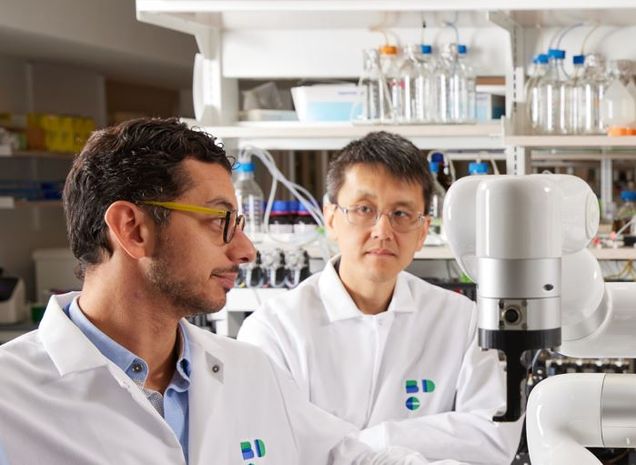Part of multi-million-dollar, multi-institution project, BU synthetic biologists to engineer cells to produce diabetes drug
By Patrick L. Kennedy
Instead of a weekly needle jab, someday a yearly injection might be all that’s needed to treat Type 2 diabetes. That annual shot—the goal of a large collaborative team that includes researchers from Boston University—would implant a tiny bioelectronic device that can manufacture up to a year’s supply of medication, making treatment easier and more affordable. The team of 18 investigators has been awarded up to $34 million from the federal Advanced Research Projects Agency for Health (ARPA-H) to make that vision a reality within six years.
“This project is crazy ambitious,” says Associate Professor Wilson Wong (BME), who along with Professor Ahmad “Mo” Khalil (BME) will be responsible for the BU College of Engineering’s contribution to the project, RX On-site Generation Using Electronics (ROGUE). “The idea is, what if you could actually make the drug inside the patient? That’s never been done before.”

Wong, Khalil, and their students will work on identifying the optimal cell chassis to serve as a living pharmaceutical factory; and on developing and testing the gene circuit technology that will enable this tiny workshop to produce, on demand, the molecules that make up therapeutics such as Ozempic, which is used to treat type 2 diabetes, and Wegovy, which the FDA has approved to reduce the risk of cardiovascular death in adults with obesity.
“It’s pretty sophisticated genetic circuit engineering we have to build,” says Wong. “The cell has to be able to produce the drug, to be able to be regulated via electricity—via signals sent from your phone. It can actually measure and control how much of the drug is made. It has to be very robust, to last a year. And ultimately, it’s going to be a safe clinical product.”
Type 2 diabetes is a chronic disease that affects 38 million people in the U.S. alone. “It’s a big problem,” says Wong, “and so is the affordability of the medication, the logistics and the hassles and the expense of buying it and administering it every week all your life.” The ROGUE system would replace that hassle and expense with a low-cost, minimally invasive procedure at an outpatient clinic, providing continuous, adjustable therapy for a full year.
Led by Tzahi Cohen-Karni at Carnegie-Mellon University, the ROGUE project also includes collaborators from Georgia Institute of Technology, Northwestern University, Rice University, University of California–Berkeley, the Mayo Clinic, and Bruder Consulting and Venture Group, encompassing backgrounds in medicine, synthetic biology, materials science, electrical engineering, and other fields.
“This project brings all this expertise together—cell engineering, miniature electronics, hydrogel materials,” says Wong. “It’s exciting. It’s ambitious, which I like. And it’s highly collaborative.”
